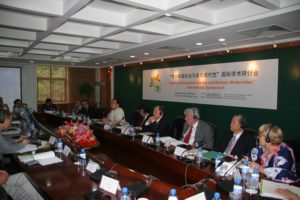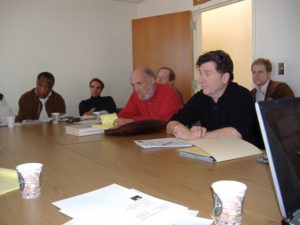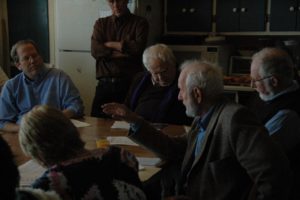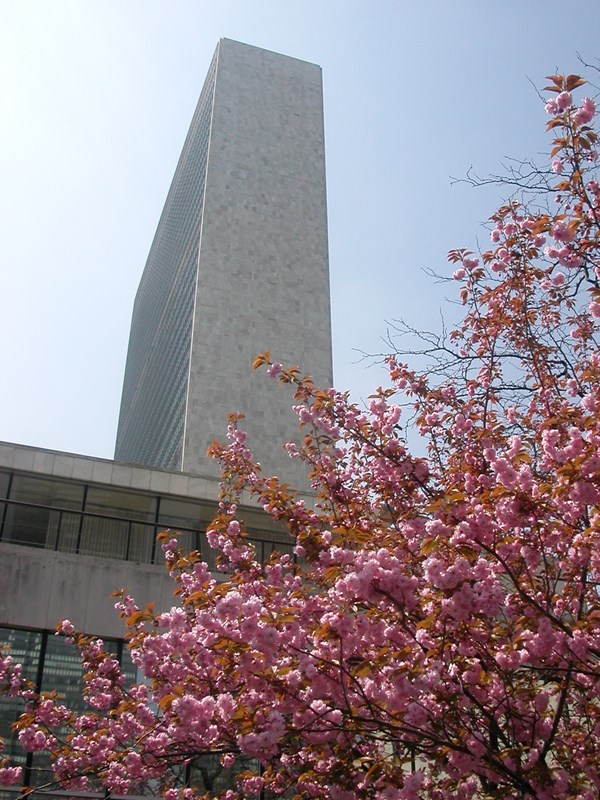
Having its origins in the United Nations, the Triglav Circle considers multilateral diplomacy, international cooperation and international law indispensable tools for addressing problems facing humankind and for building a harmonious world community. Hence its interest in the search for universal values, norms, codes of behavior that could provide some cement for such community. Keenly aware that the world is now one, that nations and peoples are increasingly linked by both threats and opportunities, the Circle believes that institutions with the vocation and the mandate to serve the common good of humankind ought to be maintained, strengthened and, if non existent but necessary, they ought to be created.
Also keenly aware of the great difficulties that such institutions are currently facing and of the strong currents of fragmentation, violence and rejection of the Other permeating the spirit of the time, the Circle reflects on the ideas and values that could form the substance of a renaissance of the spirit – a renewing of humanism oriented by spiritual insights. It promotes the views that realism is to recognize that ideals are necessary, that human beings and societies are capable of altruism, and that all forms of power, political as well as corporate, derive their legitimacy from servicing the community. The Circle reflects on changing relationships between the public and the private spheres of society and on the notion of partnership as a new organizing principle of international relations.
International Symposium:
Development for Harmonious Societies in a Pluralistic World, Bejing, Event with Chinese Academy of Science and representatives of the Triglav Circle Beijing, China: 23-24 June 2006
The concepts of harmony and harmonious society
Harmony with the self, with others, with nature and with Heaven is a concept and a quest at the heart of the Chinese civilization. In the Confucian perspective, such harmony is the aim of human flourishing. It gives meaning to the cultivation of the self, which, because of the fundamental human interrelatedness, can never be an egotistic exercise, and it gives a direction to politics, which, for Confucius, is in the realm of moral persuasion.
In the Chinese language, “he xie”or harmony, is represented by two characters. The first character combines the ideas of “harvest” and “mouth,” meaning that when there is a good harvest and people are well fed, harmony comes within the household, the society, and the world. The second character stands for “speech” or “music” and “all” or “everyone,” implying that harmony results from everyone speaking or playing in agreement. Harmony therefore requires shared prosperity and unity of purpose. Not unlike a symphony, or a painting, or a beautiful landscape, a harmonious society is made of different parts acting in unison, or placed in a symbiotic relationship. .”
Thus, the creation and maintenance of an harmonious society is equivalent to a work of art demanding education – or what is called “training” — intelligence, imagination, and effort on the part of all its members. Harmony, in a society as in a person, is a process rather than the product of sudden change. There is a continuum in this creative process between private and public action, and between private harmony and societal harmony. Click here to read more post 78
In the Chinese language, “he xie”or harmony, is represented by two characters. The first character combines the ideas of “harvest” and “mouth,” meaning that when there is a good harvest and people are well fed, harmony comes within the household, the society, and the world. The second character stands for “speech” or “music” and “all” or “everyone,” implying that harmony results from everyone speaking or playing in agreement. Harmony therefore requires shared prosperity and unity of purpose. Not unlike a symphony, or a painting, or a beautiful landscape, a harmonious society is made of different parts acting in unison, or placed in a symbiotic relationship. .”
Thus, the creation and maintenance of an harmonious society is equivalent to a work of art demanding education – or what is called “training” — intelligence, imagination, and effort on the part of all its members. Harmony, in a society as in a person, is a process rather than the product of sudden change. There is a continuum in this creative process between private and public action, and between private harmony and societal harmony.
Click here to read more…

The Cosmopolitan Ideal: Content and Actors
REPORT ON THE DISCUSSION Co-organized by The Triglav Circle and the Orfalea Center for Global and International Studies at the University of California, Santa Barbara, and hosted by the Bren Center for Environmental Science and Management , University of California, Santa Barbara, March 2008.
The universe was made to greet, or create human beings. There is necessity for the creation of humankind, as a sort of mirror. Without human beings, “reality” would only be a combination of elementary particles. The universe needs us because we give sense to the universe. Therefore, we human beings are important and we should do everything we can to continue our journey. The possibility of the existence of the world depends on our existence. And Man has the freedom and the responsibility to choose either suicide or survival.
Overcoming of the risk of humankind’s demise ought to be the primary and compelling reason for a change of course in the current management of human affairs and for the building of a cosmopolitan society.
Click here to read more
The Global Civil Society,
Report on Seminar, Co-organized by The Triglav Circle and the Orfalea Center for Global and International Studies at the University of California, Santa Barbara, and hosted by the Bren Center for Environmental Science and Management , University of California, Santa Barbara, March 2006
The phenomenon of the civil society deserves considerable attention. Many intellectuals and participants in the political process feel that an active civil society represents the best hope for the emergence of a less-predatory, fairer, and more harmonious global order. An active civil society is essential to political communities seeking to ensure the common good, including sustainable development, social justice, and human flourishing, which depend on the ethical force of concerned individuals and citizen groups throughout the world; a dynamic promoting moral globalization. The nature and the legitimacy of the power of the various bodies perceived as composing the civil society, and their relations with national and international public institutions is the focus for discussion at this gathering. This topic includes an exchange of views on the characteristics, beliefs and values of the leaders, groups, and institutions that compose the civil society and on their political roles as agents acting to overcome deleterious world environmental, economic, cultural, social and political trends. There is pressing need to consider how civil society can be more effective nationally and globally so as to better respond to the grave challenges facing the world.
Click here to read more
Report of the 23/1/21 zoom meeting of the Triglav Circle has just been published on the web site together with the two videos of the zoom sessions AM for participants in Europe and Asia and PM for participants in Europe and North America.
COMMON GOOD AND SOCIAL JUSTICE
TRIGLAV CIRCLE MEETING 23/1/21
REPORT
The “cry of the earth” and the “cry of the poor” have to be heard, said Pope Francis in his encyclical letter Laudato S’I.[1] The disharmonies between humankind and nature is linked to other crises, including the Covid pandemic, increasing inequalities and deprivation. Widespread violence, insecurity, and contempt of many governments for human rights further put into question the foundations of modern civilization. Could the notion of common good, with its material, moral and spiritual exigencies, provide the intellectual and political framework to guide corrective public and private policies and actions at all levels?
[1] Pope Francis, Laudato S’i On Care for Our Common Home, Encyclical Letter, 2015, The World Among Us Press, Frederick, Maryland, USA
Clic here to read the report
Meetings of the Circle
Moral Dimensions of the Public Discourse: The Legacy of the Social Summit revisited – Feb. 2005
Moral pronouncements, injunctions or exhortations have always been part of the discourse of political leaders and have always shaped political doctrines and parties and political debates and controversies. And there has always been morally inspiring, morally mediocre, and morally degrading political discourses. Some have called on generosity, solidarity and the noblesse of the human spirit. Others have stirred hate, racism and aggressiveness. And, in any case, many of these discourses have shaped history, for the better and for the worst. This power of the word is compounded, at least in terms of speed and scope of its dissemination, by the present means and techniques of communication. Some political statements resonate throughout the world. And the world is made of nations and regions that are both increasingly interdependent and increasingly divided within and among themselves.
Click here to read more
Current Crisis and the Spirit of Man, March 2009
The link between enchantment and the question of rights and responsibilities is the notion of dignity. Let’s reflect on the question of protecting human dignity. Dignity is not an inherent quality that we carry with us . Dignity depends on a relationships of recognition, on a self-reflective relationships. Even under extreme situations of deprivation, a human presence is able to keep this fragile and vulnerable value called dignity. The formulation of human rights is a way of suggesting those points, those situations when dignity is fragile and needs protection. Then rights and responsibilities are linked. And comparable points can be made about the dignity of animals, of plants, of all elements of the natural world.
Notion of dignity of the universe. Behind the legal or philosophical thinking on human rights, there is the notion of human dignity, this dignity that depends on the recognition by others. And there is the question of the relationships between dignity and honor.
Click here to read more
Papers and Articles
A Requiem for Multilateralim in an Era of Increasing Interdependence
In the halcyon days of multilateralism during the 1990s, the prospects for strengthening global cooperation looked very promising due to the political changes in Russia and the Eastern bloc states and the liberalism in Western countries. All of this seems to be changing. We are back to an assertive Russia, and now also a powerful China, and witnessing the death of liberalism or attenuation thereof in a number of Western countries.
Compassionate Leadership for an Interdependent World, ” presentation by Steven C. Rockefeller
We have come together for this conference to think deeply about the kind of creative and courageous leadership that is needed at the local and global level to address the urgent challenges that face our world, including climate change, violent conflict, and a destabilizing global economic recession. We are in the midst of a crisis of global governance that can only be met with a partnership of government, business, and civil society and imaginative new approaches to our environmental, economic, and social problems.
Click here to read more
Toward a Necessary Utopianism: Democratic Global Governance, by Richard Falk
Unless the emergence of an effective form of global governance is adequately democratized it will not only reproduce existing acute inequities and exploitative patterns of present world order, but will almost certainly intensify these malevolent features. Such forebodings are based on the assessment of present global trends that document increasing
disparities among peoples, races, and classes, but also call to our attention the growing struggle over dwindling oil supplies and the overall harmful effects of global warming and various associated forms of environmental deterioration.
Click here to read the entire article.
The Dynamics From the Ideal to the Reality: The Rule of Law in China, by ZHANG Qi
The ideal of the rule of law in China consists of four aspects. The third and fourth deal with its impact in China. The third, is how the reasons and rationales of the rule of law will be received by the Chinese people. The las
The Genealogy of ‘Human Dignity” : A New Perspective
By Jeremy Adler
This article considers the history of the concept of human dignity from its origins in the Bible and in Stoic philosophy down to the twentieth century. The major thinkers who contributed to the development of the idea are examined, including Pico della Mirandola, Pufendorf, Kant, and Broch. Similarly, the views of contemporary philosophers such as Jürgen Habermas and Martha Nussbaum are considered. The central thesis in this argument, which diverges from the standard view, is that Goethe occupies a pivotal role in this tradition. Goethe’s creation of an organic, holistic and self-reflective view of human dignity established a new paradigm. This innovative concept of dignity as an expression of human growth and self-realization found its way into the UDHR and German Basic Law. It is a position adopted by the German Constitutional Court in several important rulings; and it continues to find an echo in the writings of contemporary philosophers.
Read more go to: https://doi.org/10.1080/09593683.2020.1723314





